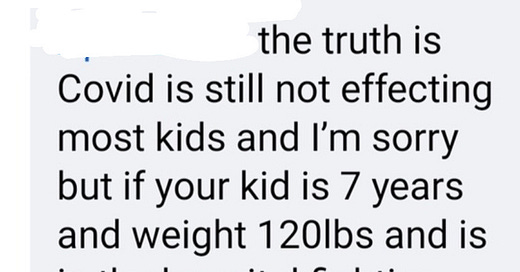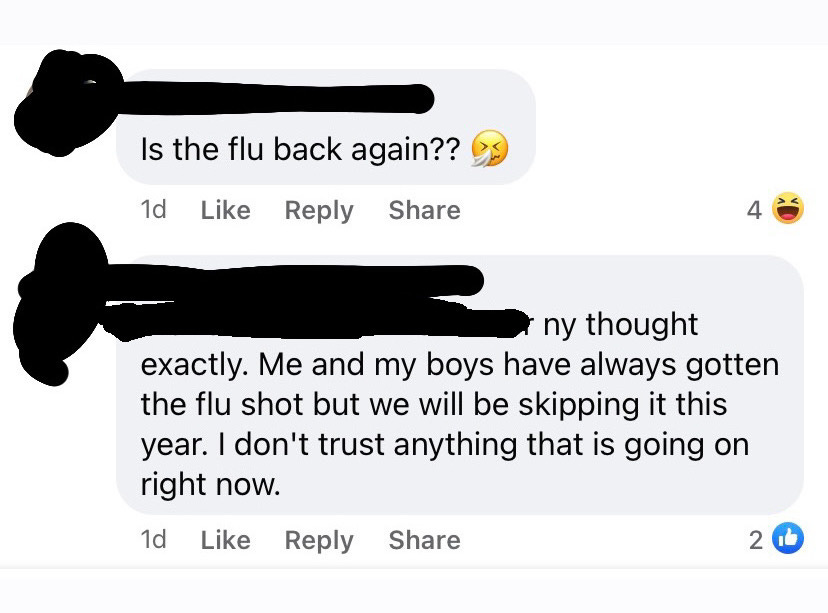Finding Empathy in the Wake of Delta
What to feel when we see others reaping what they have sown
We are finally on the tail end of the Covid delta spike in the United States. At least, I think we are. Cases and hospitalizations are declining in Arkansas, and across much of the U.S., down from a late-summer peak. (Locally, though, our case count is still at 100 active cases for a county of around 16,000 people, almost as high as it’s ever been.) On delta’s assent, more people rushed to get vaccinated, but the overall trend here is stubborn and unmoving. Statewide, 55.4 percent of adults (18 and over) are fully vaccinated. Kids 12 to 18 have the lowest take-up—just a little over a third are vaccinated, and presumably those decisions are made by their parents. When kids who are not yet eligible are taken into account, a majority of Arkansans remain vulnerable. In my county, our vaccination rate is only 41 percent, according to local officials.
What has happened instead was the only thing that could happen: people got sick. Rural America now has twice the Covid mortality rate of urban areas. Many unvaccinated people here were hoping that they would weather the virus relatively unscathed, and that the “natural immunity” they got would be superior to any acquired protection a vaccine could give them. This belief is, as far as I can tell, based on nothing. But it is repeated by a handful of health care professionals and reverberates through evangelical circles, where people believe relying on vaccines somehow indicates a lack of faith in the bodies God built us. (There is a widespread ignorance about what vaccines do, because of course they also rely on your immune system and give you immunity without making you sick. The state legislature advanced a bill this week that would allow people to opt out of employer mandates if they can prove they have “natural” antibodies, i.e., they’ve already had Covid-19.) This fits in with general suspicion of anything science-based or medical, and elevation of the pre-industrial world as some kind of pristine, harmless Eden. It is also where the far right meets the far left, because some of these ideas also linger in wellness circles—they think “natural” means “good.” These people should take anthropology. Through most of the delicate, fragile little history of homo sapiens, our species spent all of its energy barely surviving the crap nature has thrown at it.
Accompanying this is another, more sinister idea: for it to be true, it would also mean that the people who do get sick and die were just not healthy enough, or didn’t have enough faith, or didn’t pray hard enough. As is true of all tests of faith, all beliefs in predestination, this is unprovable. If you pray enough you live and God answered your prayers; if you die it means you didn’t do everything right. Someone local took to Facebook to blame a child’s illness on their body size, which is the grotesque, logical endpoint of this kind of thinking.
But that’s not every unvaccinated person. The answers to why so many here remain unvaccinated are complicated and interrelated. In Kaiser Family Foundation surveys, only about 14 percent of all Americans say they will “definitely not” get the vaccine. They believe all kinds of misinformation, including that it is more dangerous than the virus itself, and may also just be against vaccines generally. (They’re probably unevenly distributed across the country and disproportionate in a place like rural Arkansas.) This anti-Covid-vaccine attitude is now spreading to other vaccines:
This has become interwoven with political identity. Another group of Americans say they have to be forced—which is happening now—and still more are hesitant or have some sort of logistical barrier that is difficult to overcome. Largely Republican states have more logistical barriers than blue ones, and these are created by political choices: employers in them are less likely to have paid time off for workers to get the vaccine, less likely to have paid sick days, less likely to have local politicians and leaders actively advocating for the vaccine and getting out into communities to promote it, and will be the least likely to hold workplaces that don’t enforce mandates accountable.
The cultural default set in red states is that you have to get the vaccine of your own volition, according to your own personal choice, and overcome any barriers to getting it on your own. In blue states, where people are surrounded by other vaccinated people, the default is the opposite. If you look at the U.S. map of the percentages of the population fully vaccinated, it could just as easily be a map of infrastructure, of spending on social programs, of education, of income levels, and of political identity.
I have, in general, been trying to keep tabs on who gets sick and what happens to them in my community. It feels to me that no one else—not officials, not the newspapers—is documenting the exact toll the virus has taken, except in numerical terms. In the first wave, we had 24 deaths, but now the total number of known Covid deaths is up to 37. Almost every one of the last 13 have been avoidable. Some of the people who’ve been sick are responsible, directly or indirectly, for the illnesses and deaths of others. Everything that happens now feels like a direct consequence of purposeful actions, and the dying are victims only of their own prejudices. The vaccine is free, widely available, fully approved, obviously safe, and the excuses people give are wearing thin. Enter the Herman Cain Awards reddit, a depressing and repetitive log of anti-vaxxers who have died, all believing that they’re right until the very end.
I know some have been struggling to still feel empathy for those who contract Covid-19 now. But I know what happens when you stop feeling empathy. A person without empathy is one who refuses to believe a virus is real as long as it’s primarily harming people who live far away, who are unknown, who don’t look like them. A person without empathy refuses to take a vaccine that would protect themselves and others because the only things they care about are their own beliefs and fears. A person without empathy demands sympathy for their freely made choices even when the consequences for their choices are bad, even if they would not extend that sympathy to others, and would in fact blame others’ suffering on their personal choices. I don’t know how short the road is to becoming that kind of person, but I suspect its starting point is a first step that is too easy to take, a path that has been cleared by what feels like justice or karma, a way that is lighted by confidence that we are right. Empathy is a muscle that needs to be exercised, an action that requires continued practice. And so I’ve been finding ways to fight against losing it. Every unvaccinated person who dies has a friend or family member who begged them to get vaccinated and is torn apart by the senselessness of their loss, and so I hold that in my mind.
What I’m Reading:
I mentioned before I’m reading the Tana French books. I’ve now made my way to The Trespasser, the sixth and final in the Dublin Murder Squad series. What’s fascinating about these books is that they’re not so much about the cases themselves, and they definitely don’t turn the detectives into heroes. Instead, each story is about how a particular case completely undoes a certain detective: it’s the one that hits too close to home and tears them apart, in one way or another. The first of the series, In the Woods, is the weakest, but I’d still start there. (I check these out electronically via my local library. Yay for libraries!)
Cute Animal Pic of the Week:
A little more than eight years ago I adopted Sampson, my first pet as an adult. Still going strong with my favorite furry buddy.





